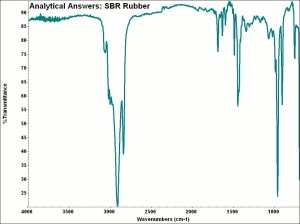Difference between revisions of "Styrene-butadiene rubber"
Jump to navigation
Jump to search
m (Text replace - "== Authority ==" to "== Sources Checked for Data in Record ==") |
|||
| (5 intermediate revisions by 2 users not shown) | |||
| Line 1: | Line 1: | ||
== Description == | == Description == | ||
| − | An elastomer made by copolymerizing [ | + | An elastomer made by copolymerizing [[butadiene|butadiene]] with [[styrene|styrene]]. Styrene-butadiene rubber is commonly called Buna-S and SBR. Large amounts of the copolymer were first commercially produced in the 1930s as a synthetic replacement for [[rubber (natural, vulcanized)|natural rubber]]. Currently, styrene-butadiene is the most widely used [[rubber (synthetic)|synthetic rubber]]. SBR has good water and heat resistance but poor [[oil|oil]], [[solvent|solvent]], and [[oxidation|oxidation]] resistance. It also has a tendency to crawl. SBR is used for tires, footwear, adhesives, coatings, and carpet backing. |
| − | + | == Synonyms and Related Terms == | |
| − | + | butadiene styrene; Buna-S; SBR rubber; butadieno-estireno (Esp.); butadiène-styrène (Fr.); butadieno-estireno (Port.) | |
| − | + | == Applications == | |
| + | [[[SliderGallery rightalign|aaiSBR_RUBR.jpg~FTIR]]] | ||
| + | ==Risks== | ||
| − | == | + | == Resources and Citations == |
* G.S.Brady, ''Materials Handbook'', McGraw-Hill Book Co., New York, 1971 Comment: p. 629 | * G.S.Brady, ''Materials Handbook'', McGraw-Hill Book Co., New York, 1971 Comment: p. 629 | ||
| Line 19: | Line 21: | ||
* M.Kaufman, ''The First Century of Plastics'', The Plastics and Rubber Institute, London, 1963 | * M.Kaufman, ''The First Century of Plastics'', The Plastics and Rubber Institute, London, 1963 | ||
| − | * Art and Architecture Thesaurus Online, | + | * Art and Architecture Thesaurus Online, https://www.getty.edu/research/tools/vocabulary/aat/, J. Paul Getty Trust, Los Angeles, 2000 |
| + | * Theodore J. Reinhart, 'Glossary of Terms', ''Engineered Plastics'', ASM International, 1988 | ||
[[Category:Materials database]] | [[Category:Materials database]] | ||
Latest revision as of 11:28, 18 October 2022
Description
An elastomer made by copolymerizing Butadiene with Styrene. Styrene-butadiene rubber is commonly called Buna-S and SBR. Large amounts of the copolymer were first commercially produced in the 1930s as a synthetic replacement for natural rubber. Currently, styrene-butadiene is the most widely used synthetic rubber. SBR has good water and heat resistance but poor Oil, Solvent, and Oxidation resistance. It also has a tendency to crawl. SBR is used for tires, footwear, adhesives, coatings, and carpet backing.
Synonyms and Related Terms
butadiene styrene; Buna-S; SBR rubber; butadieno-estireno (Esp.); butadiène-styrène (Fr.); butadieno-estireno (Port.)
Applications
Risks
Resources and Citations
- G.S.Brady, Materials Handbook, McGraw-Hill Book Co., New York, 1971 Comment: p. 629
- Richard S. Lewis, Hawley's Condensed Chemical Dictionary, Van Nostrand Reinhold, New York, 10th ed., 1993
- Pam Hatchfield, Pollutants in the Museum Environment, Archetype Press, London, 2002
- M.Kaufman, The First Century of Plastics, The Plastics and Rubber Institute, London, 1963
- Art and Architecture Thesaurus Online, https://www.getty.edu/research/tools/vocabulary/aat/, J. Paul Getty Trust, Los Angeles, 2000
- Theodore J. Reinhart, 'Glossary of Terms', Engineered Plastics, ASM International, 1988
